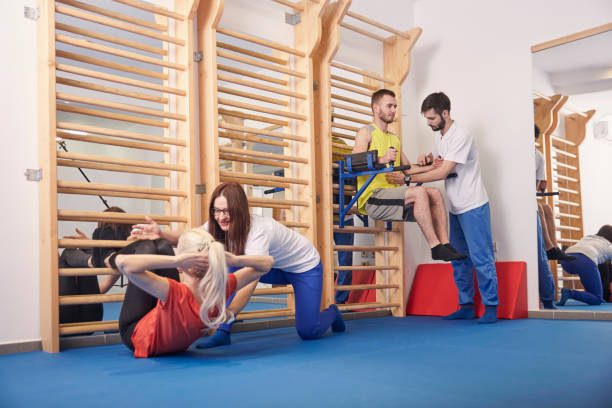
| Recreational Therapist Key Stats | |
|---|---|
| Avg. Salary / year | $48,940 |
| Avg. Pay / hour | $23.53 |
| Education | 3-4 Years |
| Job Outlook | 7% |
Recreational Therapists work with patients with disabilities or who have been diagnosed with an illness.
These professionals use a variety of techniques to help patients with their emotional, physical and mental health.
Recreational Therapists work in a wide range of health locations such as hospitals, clinics and rehabilitation centers.
These professionals work constantly with individuals who are ill or disabled and must be able to work comfortably in this type of setting.
Recreational Therapists must also be able to work with a several other professionals in order to determine the best treatment plan for their patients.
If you are interested in a career where you can work with people and help patients improve their lives, consider the following related professions:
- Child Psychologist
- Family Counselor
- Herbal Therapist
- Music Therapist
- Pediatric Therapist
- Wellness Coordinator
Continue reading the information below to learn how to become a Recreational Therapist , a general job description, salary and wage data and the future job outlook through the year 2018.
Table of Contents
Education Requirements to Become a Recreational Therapist
The minimum educational requirement to become a Recreational Therapist is a four year Bachelor’s degree.
In addition, there are some states that require candidates to attain licensure, a title or register with the state.
You will need to research your state’s medical board in order to determine whether you need to fulfill any of the aforementioned prerequisites.
Students who want to become a Recreational Therapist should major in Therapeutic Recreation or in Recreation with a specialization in Therapeutic Recreation.
A candidate can become a Recreational Therapist if they have a combination of training, education and experience in a similar field.
There are currently more than 100 programs that offer a degree in Therapeutic Recreation.
The level of degree depends on the educational institution.
Some schools may offer a range of degrees including Associate, Bachelor, Master or Doctoral level.
A typical Therapeutic Recreation program will offer courses in physiology, anatomy, psychology and ethics.
Courses students will take that are related to the profession include teaching how to use technical devices, assessment protocol, evaluation techniques, organizing a treatment plan and designing interventions.
Some Therapeutic Recreation Bachelor programs may also offer the opportunity to complete an internship in order to earn the degree.
Recreational Therapist Job Description
Recreational Therapists work in a health care including facilities such as hospitals, clinics or rehabilitation centers.
They are responsible for meeting with other healthcare professionals to determine the best type of treatment for their patients.
Recreational Therapists use a combination of recreational activities and treatment plans in order to improve a patient’s physical, mental and emotional health and well being.
The type of techniques they implement may include the following:
- Arts and Crafts
- Dance
- Drama
- Music
- Games
- Sports
These types of activities are geared to treat and rehabilitate a patient.
Recreational Therapists are experienced at easing patients’ depression, anxiety and stress.
In addition, these techniques can help improve patients’ basic motor functions and teach them how to manage the physical effects of a disability.
These techniques are geared to help the patient outside of treatment and help them build confidence while out in public.
Recreational Therapist Salary and Career Path
The Bureau of Labor Statistics reports that the median annual wage for Recreational Therapists was approximately $38,370 per year.
The national salary range for these professionals during the same year was approximately $23,150 to 60,280 per year.
Exact wages for these professionals will be determined by the industry they are employed in, the geographical location and years of experience.
The employment outlook for Recreational Therapist looks promising and is expected to grow at a faster than average pace.
The Bureau of Labor Statistics reports that employment opportunities for these professionals is expected to grow by about 15 percent through the year 2018.
This growth is attributed to a growing elderly population that may require the help of a Recreational Therapist.
As a whole, health care careers are expected to grow faster than in most other industries.
Even with an expected growth in employment opportunities, those who want to become a Recreational Therapist should expect some stiff competition.
Employers are more likely to hire candidates with a Bachelor’s degree in Therapeutic Recreation and who also hold a Certified Therapeutic Recreation Specialist license.
![]() The below information is based on the 2021 BLS national averages.
The below information is based on the 2021 BLS national averages.
National Average Salary
$53,900Average Salary by State
| State | Avg. Annual Salary |
|---|---|
| Alabama | $48,940 |
| Arizona | $53,790 |
| Arkansas | $48,880 |
| California | $71,380 |
| Colorado | $47,470 |
| Connecticut | $61,640 |
| Delaware | $42,130 |
| District of Columbia | $68,770 |
| Florida | $50,720 |
| Georgia | $46,870 |
| Idaho | $48,250 |
| Illinois | $58,510 |
| Indiana | $41,600 |
| Iowa | $48,480 |
| Kansas | $34,090 |
| Kentucky | $50,240 |
| Louisiana | $45,480 |
| Maine | $51,390 |
| Maryland | $49,090 |
| Massachusetts | $54,460 |
| Michigan | $50,780 |
| Minnesota | $51,580 |
| Mississippi | $36,380 |
| Missouri | $49,260 |
| Nebraska | $52,800 |
| Nevada | $50,990 |
| New Hampshire | $56,270 |
| New Jersey | $66,920 |
| New Mexico | $39,820 |
| New York | $59,850 |
| North Carolina | $48,430 |
| Ohio | $49,410 |
| Oklahoma | $39,830 |
| Oregon | $63,760 |
| Pennsylvania | $52,950 |
| South Carolina | $47,730 |
| Tennessee | $45,900 |
| Texas | $57,890 |
| Utah | $45,290 |
| Virginia | $49,900 |
| Washington | $59,870 |
| West Virginia | $45,250 |
| Wisconsin | $49,590 |
| Wyoming | $52,740 |
| Puerto Rico | $36,380 |
The top earning state in the field is California, where the average salary is $71,380.
These are the top 5 earning states in the field:
* Employment conditions in your area may vary.
Frequently Asked Questions
What is a recreational therapist?
Recreational therapists help people with disabilities, injuries, or illnesses recover through recreation-based treatment programs.
They use a variety of methods, including arts and crafts, music, drama, sports and games, aquatics or dance.
Before developing treatment plans, therapists start by assessing patients’ needs using observation, tests, medical records and discussions with other healthcare providers.
They focus on recovering basic physical and mental abilities but also on building patients’ confidence and helping them socialize.
Recreational therapists usually specialize in treating a specific group of patients, such as elderly or children.
As a recreational therapist, you will need patience, compassion, resourcefulness but also good speaking and listening skills.
How much does a recreational therapist make?
According to the Bureau of Labor Statistics, the median annual wage of recreational therapists was $47,860, as of May 2018.
Salaries vary depending on a wide range of factors; some recreational therapists earn less than $30,000 per year, while others make more than $75,000.
How much does it cost to become a recreational therapist?
Recreational therapists typically need a bachelor’s degree in recreational therapy or a related field and most employers require certification from the National Council for Therapeutic Recreation Certification.
Bachelor’s degree programs in recreational therapy cost, on average, around $30,000-$35,000 a year.
Tuition fees vary widely, depending on the college you choose and the program itself.
Two-year associates degree programs are also available and cost on average around $20,000 a year.
In order to take the certification exam, you will have to pay a $325 registration fee.
What is the demand for recreational therapists?
According to the Bureau of Labor Statistics, the employment of recreational therapists is expected to grow 7 percent from 2018 to 2028.
As the population grows, more recreational therapists will be needed to help patients in hospitals, hospices or daycare treatment centers.
In order to have the best job prospects, you will need a license and a bachelor’s degree from a reputable institution.
Those who specialize in working with the elderly may have better job opportunities.
How long does it take to become a recreational therapist?
Recreational therapists typically need at least a bachelor’s degree, which can be earned in approximately 4 years.
Most states don’t require licensure, but many employers require recreational therapists to be certified by the National Council for Therapeutic Recreation Certification (NCTRC).
Before registering for the exam offered by the NCTRC you need to obtain your bachelor’s degree in recreational therapy and complete a 14-week internship supervised by the CTRS.
Applicants who hold a bachelor’s degree in a different field but have completed coursework in recreational therapy and have 5 years of full-time work experience in recreational therapy (or 1 year of work experience under the supervision of CTRS) can also get their certification if they successfully complete the certification exam.
The Professional Eligibility Application can be submitted online to the National Council for Therapeutic Recreation Certification.
It will take around 4-6 weeks until your application is reviewed by the NCTRC.
The National Council for Therapeutic Recreation Certification also offers specialty certification in behavioral health, developmental disabilities, geriatrics, community inclusion services, and physical medicine/rehabilitation.













